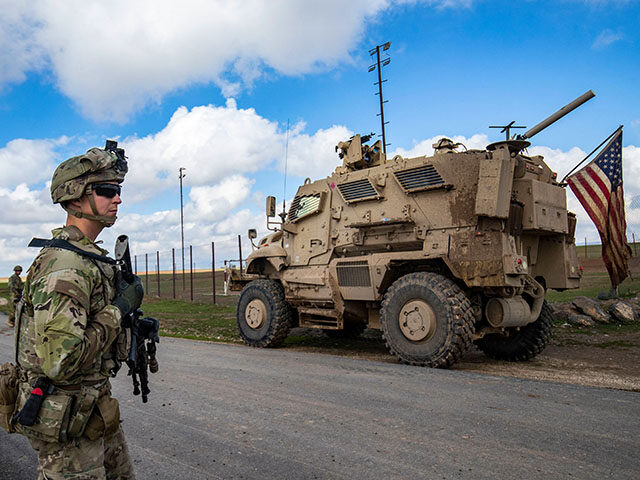Iran-controlled Shiite militias in Iraq on Thursday claimed responsibility for rocket and drone attacks on two bases housing U.S. troops in Syria and Iraq.
The militias claimed their strikes on bases in Rojava and Erbil hit their intended targets “directly.” The Pentagon confirmed the attack on Erbil, the capital of Iraqi Kurdistan, but said it caused “no casualties” and only “some minor damage to infrastructure.”
RELATED VIDEO — Waltz: Biden Needs to Eliminate Waivers on Iran Sanctions, Demand Qatar Extradite Hamas Leader:
The claims of responsibility were made on the encrypted messaging platform Telegram by the umbrella group for Iran’s Shiite militia proxies, the “Islamic Resistance in Iraq” (IRI).
IRI claimed it hit the Abu Hajar airport, located near the city of Rmelan in Syria’s Rojava province, with a “barrage of rockets.”
Rmelan is located near Syria’s border with Iraq. The Pentagon did not immediately confirm the attack, but a Lebanese news network affiliated with the Iran-backed Hezbollah terrorist organization reported rockets hitting the airport on Wednesday night.
Kataib Hezbollah (KH), a large Iraqi militia closely linked to the Qods Force terrorist unit of Iran’s Islamic Revolutionary Guard Corps (IRGC), posted a separate claim of direct responsibility for the attack. KH founder Abu Mahdi al-Muhandis was killed in the same U.S. airstrike that liquidated Iranian terrorist mastermind Qasem Soleimani in January 2020. Soleimani was working with Muhandis and other Iraqi militia leaders at the time to coordinate rocket attacks on bases housing U.S. personnel.
IRI claimed it launched three explosive-laden drones against the al-Tanf military base, located near the juncture of the Syrian, Iraqi, and Jordanian borders on Thursday morning.
An obscure militia group called Tashkil al-Waritheen claimed it piloted a suicide drone against the Harir airbase outside Erbil, the capital of the Kurdish autonomous region in Iraq. IRI said this militia was operating under its authority.
Pentagon spokesman Brig. Gen. Pat Ryder said Thursday the U.S. military was “aware of an attack today against U.S. forces at Erbil air base in Iraq that was unsuccessful.”
“We know that these are Iranian-backed militia groups that are supported by Iran and of course we hold Iran responsible for these groups,” Ryder added.
Ryder said the Erbil incident was the 16th confirmed Iran-controlled militia strike against U.S. positions in Iraq and Syria since October 17. He counted 17 minor injuries among American personnel due to the attack, including 15 cases of Traumatic Brain Injury (TBI).
“In all cases, members returned to duty,” he said.
On Tuesday, Secretary of State Antony Blinken pleaded with Iraqi Prime Minister Mohammed Shiaa al-Sudani to “pursue those behind the attacks and fulfill Iraq’s commitment to maintain security.”
Sudani gave public orders for the Iraqi military to hunt down the IRI militias, but there was no sign of the Iraqi army actually engaging militia units in combat or making arrests as of Friday, and the militias are still attacking U.S. positions with impunity.
U.S. officials said American forces would respond if the attacks continued. On Thursday night, U.S. warplanes struck two facilities in eastern Syria controlled by the Iranian IRGC and its militia proxies.
A senior American military official told ABC News on Thursday that one of the targets was a “weapon storage area,” and the other was an “ammunition storage area.” Munitions stored at these locations were linked by U.S. military intelligence to the rocket and drone attacks against American personnel in Iraq and Syria.
Another senior U.S. defense official said the destruction of these two depots would “impact the ability of the IRGC and IRGC-backed militia groups to continue to attack our forces and continue destabilizing the region.”
Secretary of Defense Lloyd Austin announced the “self-defense strikes” in a statement that described them as “a response to a series of ongoing and mostly unsuccessful attacks against U.S. personnel in Iraq and Syria by Iranian-backed militia groups.”
“Iran wants to hide its hand and deny its role in these attacks against our forces. We will not let them. If attacks by Iran’s proxies against U.S. forces continue, we will not hesitate to take further necessary measures to protect our people,” Austin said.

COMMENTS
Please let us know if you're having issues with commenting.